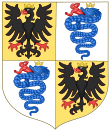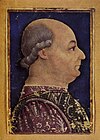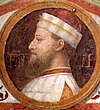| Sforza | |
|---|---|
 | |
| Country | |
| Founded | 1411 |
| Founder | Muzio Attendolo Sforza |
| Final ruler | Milan: Francesco II (1535) Pesaro: Galeazzo Sforza (1512) |
| Titles |
|
| Estate(s) | Milan, Pesaro, Gradara |
| Cadet branches |
|
The House of Sforza (Italian: [ˈsfɔrtsa]) was a ruling family of Renaissance Italy, based in Milan. Sforza rule began with the family's acquisition of the Duchy of Milan following the extinction of the Visconti family in the mid-15th century and ended with the death of the last member of the family's main branch, Francesco II Sforza, in 1535.
History
The first son of Muzio Attendolo Sforza, Francesco I Sforza, married Bianca Maria (1425–1468) in 1441. She was the daughter and only heir of the last Duke of Milan, Filippo Maria Visconti. He thus acquired the title of Duke of Milan (1450–1466), ruled Milan for 16 years, and made the Sforzas the heirs of the house of Visconti.
The family also held the seigniory of Pesaro, starting with Muzio Attendolo's second son, Alessandro (1409–1473). The Sforza held Pesaro until 1512, after the death of Costanzo II Sforza.
Muzio's third son, Bosio (1411–1476), founded the branch of Santa Fiora, who held the title of count of Cotignola; the Sforza ruled the small county of Santa Fiora in southern Tuscany until 1624. Members of this family also held important ecclesiastical and political positions in the Papal States, and moved to Rome in 1674, taking the name of Sforza Cesarini.
The Sforza became allied with the Borgia family through the arranged marriage (1493–1497) between Lucrezia Borgia and Giovanni (the illegitimate son of Costanzo I of Pesaro). This alliance failed, as the Borgia family annulled the marriage once the Sforza family were no longer needed.
In 1499, in the course of the Italian Wars, the army of Louis XII of France took Milan from Ludovico Sforza (known as Ludovico il Moro, famous for taking Leonardo da Vinci into his service).
After Imperial German troops drove out the French, Maximilian Sforza, son of Ludovico, became Duke of Milan (1512–1515) until the French returned under Francis I of France and imprisoned him.
In 1521 Charles V drove out the French and restored the younger son of Ludovico, Francesco II Sforza to the duchy. Francesco remained the ruler of Milan until his death in 1535 and as he was childless the Duchy reverted to the Emperor, who passed it to his son Philip II in 1540, thus beginning the period of Spanish rule in Milan.
Sforza rulers of the Duchy of Milan

- Francesco I, 1450–1466
- Galeazzo Maria, 1466–1476
- Gian Galeazzo, 1476–1494
- Ludovico, 1494–1499
- Massimiliano, 1513–1515
- Francesco II, 1521–1535
Sforza rulers of Pesaro and Gradara
- Alessandro, 1445–1473
- Costanzo I, 1473–1483
- Giovanni, 1483–1500 and 1503–1510
- Costanzo II, 1510–1512
- Galeazzo [it], 1512
Sforza family tree

- Muzio Sforza with mistress Lucia da Torsano had 7 illegitimate sons
- son Gabriele Sforza archbishop of Milan
- son Francesco I Sforza married Bianca Maria Visconti
- son Galeazzo Maria Sforza married Bona of Savoy, mistress Lucrezia Landriani
- daughter Bianca Maria (1472–1510), second wife of Holy Roman Emperor Maximilian I
- son Gian Galeazzo (1469–1494), married his cousin Isabella of Naples
- son Francesco (II), nominally duke under the regency of Ludovico Maria
- daughter Bona (1494–1557), second wife of King of Poland and Grand Duke of Lithuania Sigismund I the Old
- daughter Ippolita Maria Sforza (1493–1501)
- illegitimate daughter Caterina Sforza married Giovanni de' Medici il Popolano
- illegitimate son Ottaviano Maria Sforza bishop of Lodi
- son Ludovico il Moro (the Moor) (1451–1508)
- son Ercole Massimiliano
- son Francesco II (III) Maria
- illegitimate daughter Bianca Sforza (1483–1496) married to Galeazzo Sanseverino
- illegitimate son Giovanni Paolo I (1497–1535), marquess of Caravaggio
- son Ascanio (1444–1505), Cardinal
- daughter Ippolita Maria (1446–1484), married king of Alfonso II d'Aragon of Naples
- illegitimate daughter Polissena (1428–1449), married Sigismondo Pandolfo Malatesta
- son Galeazzo Maria Sforza married Bona of Savoy, mistress Lucrezia Landriani
- son Alessandro, first lord of Pesaro
- son Costanzo I
- son Giovanni (1466–1510), first husband of Lucrezia Borgia
- son Costanzo II (Giovanni Maria) last ruler of Pesaro
- son Giovanni (1466–1510), first husband of Lucrezia Borgia
- son Costanzo I
- Bosio (count of Cotignola, lord of Castell'Arquato)
Notable members
Castellini Baldissera
While the House of Sforza has died out over the last century, it is closely related to the Castellini Baldissera family, who inherited a number of their palazzos and estates.
In popular culture
- One of the cursed artefacts from Friday the 13th: The Series was the "Sforza Glove", attributed to the original family's possession.
- Thomas Harris's character Hannibal Lecter is a descendant of the House of Sforza.
- In the book, anime, and manga series Trinity Blood, the Duchess of Milan, who is also one of the Cardinals, is named Caterina Sforza.
- Caterina Sforza appears as a non-playable character in the video game Assassin's Creed 2 and its sequel, Assassin's Creed: Brotherhood.
- The Sforza figure prominently in the Showtime series The Borgias.
- The house is mentioned in a song about the Borgia family in the British edutainment TV show Horrible Histories.
- There are notable members from the family in the television series Medici.
- There is a campaign in the Age of Empires II: Definitive Edition computer game named after the Sforza family where the player takes up the position of Francesco I Sforza.
See also
References
- "Muzio Attendolo Sforza". British Museum.
- ^ "Mila, Leonardo and the Sforza Family". Cenacolo Vinciano (Last Supper Museum).
- "Bianca Maria Sforza". The Metropolitan Museum of Art.
- "Alessandro Sforza, 1409-1468, Lord of Pesaro 1445 [reverse], 1475". National Gallery of Art. 1475.
- ^ Eiche, Sabine (May 1985). "Towards a Study of the 'Famiglia' of the Sforza Court at Pesaro". Renaissance and Reformation.
- "La Signoria degli Sforza". Gradara.com. Retrieved 2013-04-23.
- Cartwright, Julia (1899). Beatrice d'Este, Duchess of Milan, 1475–1497: A Study of the Renaissance. Hallandale.
{{cite book}}: CS1 maint: location missing publisher (link) - Mulazzani, Germano (May 1971). "Observations on the Sforza Triptych in the Brussels Museum". The Burlington Magazine. 113 (818): 252–253. JSTOR 876636.
- "Sigismund I | king of Poland | Britannica".
- de Sio, Gian Filippo (March 2019). "Lo sfarzo abituale di una nobile famiglia milanese. Gli eredi Mellerio 1783-1792". Società e Storia (163): 57–89. doi:10.3280/ss2019-163004. ISSN 0391-6987. S2CID 187172458.
- Miller, Matt (12 October 2010). "The Real Life Characters of Assassin's Creed". Game Informer. Archived from the original on October 15, 2010. Retrieved 18 June 2019.
External links
 Media related to House of Sforza at Wikimedia Commons
Media related to House of Sforza at Wikimedia Commons











